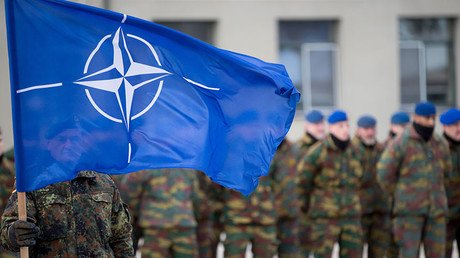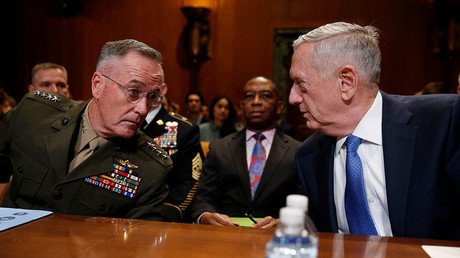NATO allies must pay more to tackle terrorism, immigration & Russia – Trump
Terrorism, migration and threats allegedly coming from Russia were named by US President Donald Trump as the main issues demanding NATO's focus and funds, as he spoke at his first meeting with the military alliance as America’s leader.
"The NATO of the future must include a great focus on terrorism and immigration, as well as threats from Russia, and on NATO's eastern and southern borders," Trump said on Thursday, speaking in Brussels at a ceremonial unveiling of a memorial to the victims of the September 2001 terrorist attacks.
Trump is on a two-day visit to the Belgian capital, Brussels, as part of his first foreign tour this week.
As he meets NATO leaders and other EU officials in Brussels for what's being described as informal talks, there was an apparent disagreement on the alleged "Russian threat."
"I am not 100 percent sure that we can say today – we meaning Mr. President and myself – that we have a common position, common opinion about Russia," EU Council President Donald Tusk told the media earlier on Thursday.
After listing what he deems the major threats to NATO, Trump switched to the topic of defense spending, saying he had been "very, very direct with [NATO] Secretary [Jens] Stoltenberg and members of the alliance in saying that NATO members must finally contribute their fair share and meet their financial obligations."
Accusing 23 NATO member states of "still not paying what they should be paying and what they are supposed to be paying for their defense," Trump reiterated his stance on financial contributions.
READ MORE: Trump slams 'deeply troubling' US intel leaks, vows investigation
"Over the last eight years, the United States spent more on defense than all other NATO countries combined," he said, adding that many of Washington's partners within the alliance "owe massive amounts of money from past years."
NATO was short of funding by $119 billion in 2016 because of the member states that failed to contribute the agreed 2 percent of GDP to allied defense, Trump claimed.
Urging partners within the military alliance to "make up for the many years lost," the US president said 2 percent of GDP spending on defense "is the bare minimum for confronting today's very real and very vicious threats."
However, "underpayments" from the majority of the bloc’s member states have become "chronic," he said.
Describing the new NATO main office in Brussels, that took almost two decades to build, as “beautiful,” Trump pointed out that he “never asked what the new NATO headquarters cost.”
“I refuse to do that,” he added.
Saying that he is "honored" to stand together with "members of an alliance that has promoted safety and peace across the world," the US president also mentioned the recent attack in Manchester as "demonstrating the depths of the evil we face with terrorism."
#Trump wants to 'get along' with Russia but says NATO 'no longer obsolete' https://t.co/VywtlgwIGn
— RT (@RT_com) April 13, 2017
Trump called the bombing of the Manchester Arena concert venue in Britain "a barbaric and vicious attack upon our civilization," branding those behind it "killers, extremists and losers."
"They are losers... Wherever they exist in our societies, we must drive them out and never ever let them back in," Trump said, adding that he had delivered the same message to Arab and Muslim leaders.
The US leader went on to criticize EU migration policy.
"You have thousands and thousands of people pouring into our various countries and spreading throughout, and in many cases we have no idea who they are. We must be tough," he said.
Ahead of the visit, the new US administration called on the military alliance to play a more significant role in fighting terrorism. Currently, several NATO allies are part of the US-led coalition fighting the Islamic State (IS, formerly ISIS/ISIL) terrorist group, but the organization itself has kept its distance from the conflict in the Middle East.
WATCH MORE:














